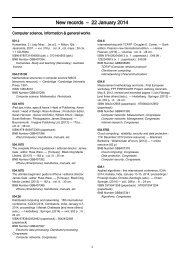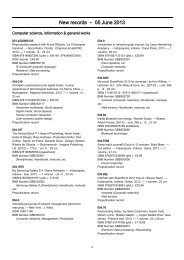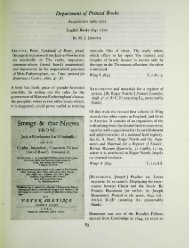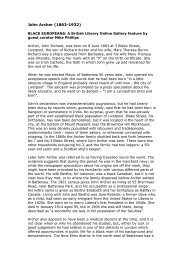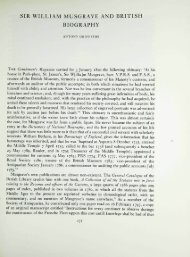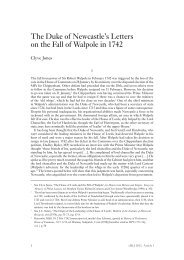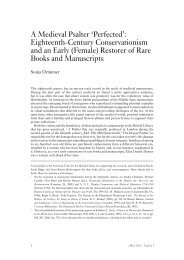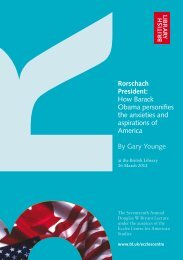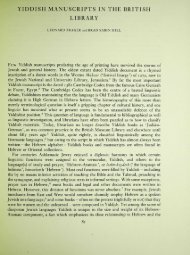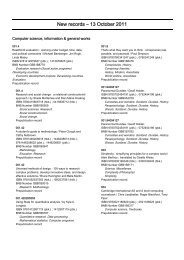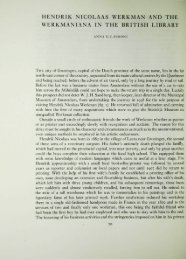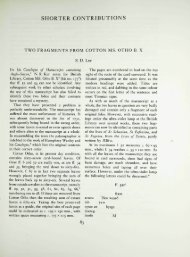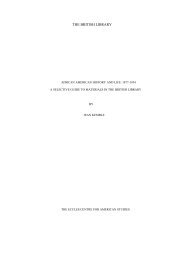Francisco Muñoz y San Clemente and his - British Library
Francisco Muñoz y San Clemente and his - British Library
Francisco Muñoz y San Clemente and his - British Library
You also want an ePaper? Increase the reach of your titles
YUMPU automatically turns print PDFs into web optimized ePapers that Google loves.
FRANCISCO MUNOZ Y SAN CLEMENTE AND HIS<br />
'REFLECTIONS ON THE ENGLISH<br />
SETTLEMENTS OF NEW HOLLAND'<br />
ROBERT J.KING<br />
THE significance of <strong>Francisco</strong> Munoz y <strong>San</strong> <strong>Clemente</strong>'s 'Reflexiones sobre Ios<br />
establecimientos Ingleses de la Nueva-Hol<strong>and</strong>a' lies in the influence it had in causing the<br />
politico-scientific expedition to the Pacific led by Alex<strong>and</strong>ro Malaspina to include in its<br />
itinerary a visit to the new English colony in New South Wales (see figs, i, 2).<br />
The 'Refiexiones' presented irrefutable reasons for Spain to send her own observers<br />
to obtain first-h<strong>and</strong> knowledge of the Botany Bay colony.<br />
Munoz came from a distinguished family. sHis father was Gonzalo Munoz de Torres,<br />
a native of Ecija, in Andalusia, who had held the appointments of Regent of the Council<br />
of Navarre <strong>and</strong> interim Viceroy of the Kingdom of Navarre. His mother was Joaquina<br />
de <strong>San</strong> <strong>Clemente</strong> y Montera, a native of Alfaro, in Navarre. His brother, Gonzalo,<br />
an officer of the ehte Real Compafiia de Guardias Marinas, died in January 1780 of<br />
wounds received during the Battle of Cape St Vincent with the <strong>British</strong> fleet comm<strong>and</strong>ed<br />
by Sir George Rodney.<br />
<strong>Francisco</strong> began <strong>his</strong> career in 1760, as a graduate of the Colegio Militar de Segovia,<br />
where he had studied mathematics, algebra, geometry <strong>and</strong> physics, civil engineering,<br />
fortification <strong>and</strong> artillery. He was admitted as sub-lieutenant to the Real Cuerpo de<br />
Artilleri'a, <strong>and</strong> from there transferred to the Royal Navy with the rank of alferez de<br />
fregata (midshipman). He first saw service in the Oriente in the expedition against<br />
Algiers in 1775. He subsequently served on board the frigate Margarita in the squadron<br />
under the comm<strong>and</strong> of Antonio de Arce, <strong>and</strong> during the summer of 1776 on the Velasco.<br />
He was then appointed to the Guardias Marinas at Cartagena, where the comm<strong>and</strong>er put<br />
him in charge of teaching cosmography, navigation <strong>and</strong> naval tactics. In 1778 he was<br />
appointed to the Real Compania de Guardias Marinas de Cadiz where, if he had not<br />
already done so, he would have made the acquaintance of Alex<strong>and</strong>ro Malaspina. In June<br />
1779 Spain joined with France against Britain in supporting the Americans in their War<br />
of Independence. Munoz served in the war against Britain on the Rayo, which formed<br />
part of the squadron under the comm<strong>and</strong> of Luis de Cordoba. In 1782 he was promoted<br />
to the rank of capitdn de fregata. From 1782 to 1786 he was interim officer comm<strong>and</strong>ing<br />
the Compafiia de Guardias Marinas de Cadiz. In August 1784 he was appointed second<br />
55
in comm<strong>and</strong> of the <strong>San</strong>ta Lucia which, under the comm<strong>and</strong> of Vicente Tofino,<br />
undertook a hydrographical survey which contributed to the compilation of the Atlas<br />
Maritimo de Espana, published in 1789.<br />
On 12 April 1785, the re-establishment of the Royal Philippines Company (which had<br />
been first set up in the reign of Philip V) was publicly announced in Madrid:<br />
The King has at last consented to the re-establishment of the Manilla Company (at the request<br />
of the merchants) which has been abolished for near 90 years; <strong>and</strong> the Prince of Asturias, heir<br />
to the Crown, is to be the patron of it. A very valuable branch of commerce will be regained by<br />
t<strong>his</strong> means, to which there is no other natural impediment than the extreme distance of these<br />
isl<strong>and</strong>s from Europe.^<br />
To explore the best direct route to the Philippines from Spain (as opposed to the<br />
traditional Acapulco-Manila galleon route), it was determined to send two ships under<br />
charter to the Royal Philippines Company by the alternative Cape Horn <strong>and</strong> Cape of<br />
Good Hope routes. Munoz was appointed to comm<strong>and</strong> of the frigate Aguila Imperial in<br />
August 1785; Alex<strong>and</strong>ro Malaspina was nominated to comm<strong>and</strong> of the Placeres at the<br />
same time, but could not take up <strong>his</strong> comm<strong>and</strong> on account of illness.^ The Aguila<br />
Imperial was to go by the Cape of Good Hope route, <strong>and</strong> the Placeres by Cape Horn.<br />
Malaspina, having recovered, was nominated to comm<strong>and</strong> of the Astrea in June 1786<br />
(instead of the Placeres), <strong>and</strong> undertook the voyage to the Philippines for the Company,<br />
going out by the Cape Horn route <strong>and</strong> returning to Spain by the Cape of Good Hope<br />
(without, however, stopping at Cape Town), arriving at Cadiz in May 1788.^<br />
The Aguila Imperial sailed for the Philippines under the comm<strong>and</strong> of Munoz,<br />
departing Cadiz in January 1786 <strong>and</strong> arriving at Manila on 8 August of that year. She<br />
sailed on the return voyage to Spain from Manila on 12 January 1787 <strong>and</strong> arrived at<br />
Cadiz on 17 March 1788. Both the outward <strong>and</strong> return voyages were by the Cape of<br />
Good Hope.'^<br />
Shortly after <strong>his</strong> return he was given leave to go to Madrid to attend to family affairs<br />
(<strong>his</strong> mother had died just after the Aguila Imperial had sailed from Cadiz).^ His presence<br />
in Madrid, <strong>and</strong> <strong>his</strong> friendship with Malaspina, were referred to in a letter which<br />
Malaspina wrote to an English friend from Cadiz on 13 July 1789: 'Munoz <strong>and</strong> the<br />
amiable Greppi are yet in Madrid.'^ It was during t<strong>his</strong> period that he wrote <strong>and</strong><br />
submitted <strong>his</strong> 'Reflexiones sobre Ios establecimientos Ingleses de la Nueva-Hol<strong>and</strong>a': it<br />
is dated <strong>San</strong> Ildefonso, 20 September 1788.<br />
In it, he wrote: 'The grave dangers which in time our commerce will experience<br />
because of their proximity to South America <strong>and</strong> the Philippines oblige us to consider<br />
the [English] settlements' (f. iv). In other words, he wrote it on <strong>his</strong> own initiative, <strong>and</strong><br />
not in response to an order or invitation. The treatise considered the advantages which<br />
New Holl<strong>and</strong> offered for settlements to the English, the sea lines of communication<br />
between the new colony <strong>and</strong> India, China, the Philippines <strong>and</strong> South America; <strong>and</strong><br />
indicated the dangers which it posed to the Spanish possessions both in peace time from<br />
the development of a contrab<strong>and</strong> commerce, <strong>and</strong> in war time as a base for <strong>British</strong> naval<br />
56
fig. I. 'Vista de la Colonia Ynglesa de Sydney en la Nueva Gales Meridional', by Fern<strong>and</strong>o<br />
Brambila, the artist on Malaspina's expedition: Madrid, Museo Naval, MS. 1724-15. By courtesy<br />
of the Museo Naval, Madrid<br />
2. A variant by Brambila of Fig. i: BL, K. Top. CXXIV (supplement) 45<br />
57
operations. He referred (f. 5r) to the newspaper accounts which *have frequently<br />
announced to us new shipments of Colonists' to Botany Bay.'<br />
Comment on the Botany Bay project in the <strong>British</strong> press, <strong>and</strong> in pamphlets <strong>and</strong> books<br />
pubhshed in Britain, could not but have aroused Spanish curiosity <strong>and</strong> suspicions. The<br />
Daily Universal Register for 12 October 1786 observed:<br />
After all that has been said, either in ridicule or animadversion on the measure of sending the<br />
convicts to Botany Bay, it is a serious truth, that in case of a future war with Spain or Holl<strong>and</strong>,<br />
a settlement there must be attended with very important advantages. The spice isl<strong>and</strong>s, the<br />
possessions which the Dutch regard with a very jealous eye, <strong>and</strong> the envied Spanish territory of<br />
Mexico <strong>and</strong> Peru, would each be exposed from [them to] successful incursion.<br />
An article in the General Advertiser of the same date said:<br />
The central situation which new South Wales, in which Botany Bay is situated, holds in the globe,<br />
cannot fail of giving it a very comm<strong>and</strong>ing influence in the policy of Europe. It extends from 44<br />
to 10 South lat. <strong>and</strong> from no to 154 long. - a month's sail from the Cape of Good Hope; five<br />
weeks from Madras; the same from Canton in China; very near the Moluccas; less than a month's<br />
run from Batavia; <strong>and</strong> lastly within a fortnight's sail of New Zeal<strong>and</strong>, which place is covered with<br />
timber, even to the water edge, of such an enormous size <strong>and</strong> height, that a single tree would be<br />
much too large for a mast of a first rate man of war. When t<strong>his</strong> colony from Engl<strong>and</strong> is established,<br />
if we should ever be at war with Holl<strong>and</strong> or Spain we might very powerfully annoy either State<br />
from the new settlement. We might, with equal safety <strong>and</strong> expedition, make naval incursions into<br />
Java, <strong>and</strong> the other Dutch settlements, or invade the coast of Spanish America, <strong>and</strong> intercept the<br />
Manilla ships. Thus t<strong>his</strong> check would, in time of war, make it a very important object, when we<br />
view it in the chart of the world with a political eye.<br />
T<strong>his</strong> report was an unacknowledged quote from the memorial to the <strong>British</strong> Government<br />
by James Matra, who had proposed since 1783 the formation of a colony at Botany Bay.<br />
The same extracts from Matra's proposal appeared in The General Evening Post of 10-12<br />
October, <strong>and</strong> in other London newspapers on 13 October 1786: The London Chronicle;<br />
The Morning Chronicle; The Whitehall Evening Post; The Mormng Post; <strong>and</strong> in The<br />
Daily Universal Register on 14 October 1786. The Spanish Ambassador to London,<br />
Bernardo del Campo, immediately forwarded a translation of t<strong>his</strong> passage, <strong>and</strong> others<br />
drawn from Matra's memorial referring to the advantages of a settlement in New South<br />
Wales, to Prime Minister Florida Blanca in Madrid.^<br />
An indication of the wide interest the Botany Bay scheme attracted throughout Europe<br />
is the quoting of t<strong>his</strong> passage <strong>and</strong> other newspaper reports by Pierre Edouard Lemontey<br />
in <strong>his</strong> prize-winning 'Eloge de Jacques Cook', given in Marseilles on 29 August 1789.^<br />
The Gaceta de Madrid of 13 <strong>and</strong> 20 October, <strong>and</strong> 14 November 1786 carried reports from<br />
the English press on the projected colony.<br />
Matra's patron <strong>and</strong> co-sponsor (together with Sir Joseph Banks) of the Botany Bay<br />
project. Captain Sir George Young, had had <strong>his</strong> own memorial published as a pamphlet<br />
in April 1785, at a time when the House of Commons Select Committee on the<br />
58
Transportation of Felons was holding hearings on suitable locations for a convict colony.<br />
As one of the principal advantages of the proposed colony, he wrote:<br />
Its great extent <strong>and</strong> relative situation with respect to the Eastern <strong>and</strong> Southern parts of the Globe,<br />
is a material Consideration; Botany Bay, or its Vicinity, the part that is proposed to be first settled,<br />
is not more than Sixteen hundred Leagues from Lima <strong>and</strong> Baldivia, with a fair open Navigation,<br />
<strong>and</strong> there is no doubt but that a lucrative Trade would soon be opened with the Creole Spaniards<br />
for English Manufactures. Or suppose We were again Involved in a War with Spain, Here are<br />
Ports of Shelter, <strong>and</strong> refreshment for our Ships, should it be necessary to send any into the South<br />
The Directors of the East India Company asked their Inspector of Sea Journals,<br />
Alex<strong>and</strong>er Dalrymple, for an opinion on the proposed colony in July 1785. Dalrymple<br />
attacked the proposal as a subterfuge for getting around the Company's charter of<br />
exclusive trade in the Pacific: 'the true prospects of the Undertakers' were 'to carry on<br />
an iHicit Trade under pretext of a Colony '. In detailing <strong>his</strong> opposition to the proposal,<br />
Dalrymple Hsted aH the reasons given by Matra <strong>and</strong> Young to support its advantages,<br />
including, 'a check upon the Spaniards at Manila; <strong>and</strong> their Acapulco Trade'. After the<br />
Government announced in September 1786 that it would proceed with the colony,<br />
Dalrymple's opinion was pubHshed under the title, A Serious Admonition to the Publick<br />
on the Intended Thief Colony at Botany Bay}^<br />
In November 1786, the London publisher (<strong>and</strong> friend of Banks) John Stockdale<br />
pubHshed An Historical Narrative of the Discovery of New Holl<strong>and</strong> <strong>and</strong> New South Wales,,<br />
to explain the reasons for the Government's decision to settle Botany Bay. The<br />
conclusion of t<strong>his</strong> book stated (p. 53), in summarizing the advantages of a settlement at<br />
Botany Bay: 'Should a war break out with the Court of Spain, cruizers from Botany Bay<br />
might much interrupt, if not destroy, their lucrative commerce from the PhiHppine<br />
isl<strong>and</strong>s to Aquapuico, besides alarming <strong>and</strong> distressing their settlements on the west<br />
coast of South America.' Although the book was published anonymously, Stockdale was<br />
habituaHy used by the Home Office <strong>and</strong> Sir Joseph Banks.^^ Stockdale also pubHshed<br />
what was in effect a revised edition of t<strong>his</strong> book, under the title of The History of New<br />
Holl<strong>and</strong>,, in April 1787. The preface of t<strong>his</strong> book (p. 16) said that the Spanish:<br />
...finding their overswoln empire so weakened as to be no longer in a condition to turn the<br />
discoveries of [Torres, Mendana <strong>and</strong> Quiros] to national profit, <strong>and</strong> foreseeing that, if they should<br />
estabHsh themselves in two or three of the South-Sea isl<strong>and</strong>s, their success would not but serve<br />
to encourage other powers to dispossess them, <strong>and</strong> thereby not only to gain the settlements from<br />
which they might be driven, but fix themselves perhaps in a situation commodious for annoying<br />
either their American dominions, or the Philippine isl<strong>and</strong>s, in the most effectual manner, they<br />
prudently chose to forego present advantage, rather than run the risque of such a future<br />
inconvenience.^^<br />
It is instructive to compare the views of Sir N. WilHam Wraxall, expressed in <strong>his</strong> A<br />
Short Review of the Political State of Great Britain at the Commencement of the Year 1787:<br />
59
The vast <strong>and</strong> unexplor'd Continent of New-Holl<strong>and</strong>, nearly equal in magnitude to that part of<br />
the earth denominated Europe, affords ample scope to the most daring <strong>and</strong> ferocious spirits; <strong>and</strong><br />
may, in the year five thous<strong>and</strong> from Christ, be peopled by the descendants of <strong>British</strong> malefactors.<br />
It is, however, far more probable, that, like the Buccaneers, so famous, <strong>and</strong> so dreaded by Spain<br />
in the last century, they will soon emancipate themselves from the feeble restraint impos'd upon<br />
them; <strong>and</strong> that they may, in succeeding times, fill the Chinese <strong>and</strong> Indian seas, with slaughter<br />
<strong>and</strong> depredation, notwithst<strong>and</strong>ing the prodigious distance, at which even these parts of the earth<br />
are removed from New-Holl<strong>and</strong>.^"^<br />
T<strong>his</strong> passage echoed an article based on Dalrymple's Admonition pubHshed in the<br />
London press in December 1786:<br />
But the serious argument against [the Botany Bay settlement], <strong>and</strong> which Mr. [Alex<strong>and</strong>er]<br />
Dalrymple has taken much pains to urge to the [East-India Company] Court of Directors, is, that<br />
it would necessarily become a harbour of pirates, <strong>and</strong> that our China trade must fall a sacrifice<br />
to their depredations. When we consider that there is a coast longer than that of America, <strong>and</strong><br />
which would in fact require the navy of all Europe to guard - that it is full of harbours, bays,<br />
creeks, <strong>and</strong> firths, some estimate may be formed of its danger to our East-India trade.^^<br />
In the Admonition^ Dalrymple had actuaHy said:<br />
the probable consequence of a Colony on New-Holl<strong>and</strong>, would be their addicting themselves to<br />
Piratical excursions amongst the Isl<strong>and</strong>s, <strong>and</strong> on the Coast of China... The regular Trade at<br />
Canton would have dem<strong>and</strong>s made for indemnification, which the whole property there would<br />
not compensate; <strong>and</strong> the lives of the fair trader <strong>and</strong> the total loss of the Trade to China might<br />
be forfeit for the transgressions of these Pirates; who would be beyond reach, if divided, <strong>and</strong> too<br />
formidable for punishment if united.<br />
All of the above-quoted <strong>British</strong> comment on the Botany Bay project could have been<br />
available to alert Spanish observers. As well as forwarding relevant extracts from the<br />
daily press as part of its normal activity, the Spanish Embassy in London paid close<br />
attention to public discussion in Britain of the Botany Bay project, as shown by the<br />
report sent to Madrid by Campo of a book by the Scottish <strong>his</strong>torian <strong>and</strong> judge, Sir John<br />
Dalrymple.<br />
The 'Account of an intended expedition into the South Seas by private persons in the<br />
late war', published in May 1788 by Sir John Dalrymple as Appendix II of <strong>his</strong> Memoirs<br />
of Great Britain <strong>and</strong> Irel<strong>and</strong>, bore upon the strategic significance of New Holl<strong>and</strong>.<br />
Dalrymple's book was pubHshed in anticipation that war was imminent between Britain<br />
<strong>and</strong> the Bourbon monarchies, France <strong>and</strong> Spain, arising from civil war in the<br />
Netherl<strong>and</strong>s. His 'Account' related to a proposal he had made to the administration of<br />
Lord North for an expedition against the Spanish empire in the South Seas upon the<br />
outbreak of war with Spain in June 1779. Dalrymple said that the Spanish war had<br />
broken out so late in the summer that there was little chance of getting an expedition<br />
ready to pass Cape Horn in the proper months of December or January, <strong>and</strong> that there<br />
60
was therefore a prospect that the most vulnerable parts of Spain's empire, her South<br />
Seas, would be safe from attack for twenty months. It occurred to Dalrymple, that since<br />
the voyages <strong>and</strong> discoveries of Captain Cook, there were two easy ways of getting mto<br />
the South Seas at any time of the year, one from Britain by way of the Cape of Good<br />
Hope; the other from India, either by the Philippines <strong>and</strong> the North Pacific (the Manila<br />
Galleon route), or by New Holl<strong>and</strong> <strong>and</strong> the South Pacific:<br />
The other route from the East Indies is by the south, to get into the latitude of 40° south in New<br />
Holl<strong>and</strong>; <strong>and</strong> from thence to take advantage of the great west wind, which about that latitude<br />
blows ten months of the year, in order to reach Chili, where the south l<strong>and</strong> wind will be found.<br />
The facility of t<strong>his</strong> last route was not known till the late discoveries, which will make the memory<br />
of Sir Joseph Banks, of Captain Cook, of Lord <strong>San</strong>dwich, <strong>and</strong> of <strong>his</strong> present Majesty, immortal<br />
in <strong>his</strong>tory... The very circumstance of the consciousness of Spain of her security for twenty<br />
months gave an advantage to those who should attempt to make her feel her mistake. The proper<br />
mode of conducting an expedition from Britain in the South Seas, was to run by the Cape of Good<br />
Hope <strong>and</strong> New Zeal<strong>and</strong> to the coast of Chili, from thence along that coast by the south l<strong>and</strong> wind<br />
into the gulf of Panama, from thence upon the trade wind with the prizes <strong>and</strong> such of their goods<br />
as were fit for the eastern markets, to the eastern isl<strong>and</strong>s, China or India.<br />
Dalrymple's 'Account' was pubHshed in The Scots Magazine of August <strong>and</strong> September<br />
1788^^ <strong>and</strong> it was fully described in The London Review for August 1788.^^<br />
Immediately upon publication of Dalrymple's book. Ambassador Campo sent a<br />
translation of these passages to Florida Blanca, with a discussion of the strategy it<br />
described. 'Fortunately,' he said, the <strong>British</strong> Government had not given the proposal<br />
'the confidence <strong>and</strong> attention it merited,' <strong>and</strong> peace had supervened to remove for a time<br />
such expectations. He continued:<br />
But after having read it with the most serious attention, <strong>and</strong> having compared it with the kinds<br />
indicated in the voyages of Anson, Bougainville, Cook <strong>and</strong> others, I formed the judgement that<br />
the enterprise would have been successful, with very considerable losses on our part, <strong>and</strong> that in<br />
any other succeeding war it would be equally so.^^<br />
Campo further commented:<br />
... if until now we have seen as the greatest security of our South Sea possessions the circumstance<br />
that, having once passed Cape Horn, the enemy would have neither port nor shelter in such a vast<br />
extent of coasts... today I do not believe we should flatter ourselves with such obstacles, for in<br />
the many isl<strong>and</strong>s which the EngHsh have frequented they have found at all times provisions,<br />
firewood <strong>and</strong> all kinds of assistance; they can leave their sick to be cured; form magazines for as<br />
much as they require; they will have shelters not only to careen <strong>and</strong> repair their vessels, but also<br />
to construct others.^^<br />
The warnings from London were reinforced from another quarter: on the furthest<br />
south-western frontier of the Spanish empire, the military governor at Concepcion, in<br />
Chile, the Irish-born Ambrose Higgins, voiced alarm at the entry of foreign ships into<br />
61
the Pacific, where Spain had hitherto enjoyed exclusive rights of navigation <strong>and</strong><br />
settlement. Following the visit of the French expedition led by Jean-Fran9ois Galaup de<br />
Laperouse to Concepcion, Higgins reported in a despatch dated 25 March 1786 to<br />
Teodoro de Croix, Viceroy of Peru, <strong>and</strong> Jose de Galvez, Minister for the Marine <strong>and</strong> the<br />
Indies:<br />
... none of the members of the present expedition exhibit any thought but enthusiasm for<br />
research, for the improvement of navigation, for the extension of geographical knowledge, the<br />
exploration of seas <strong>and</strong> isl<strong>and</strong>s, <strong>and</strong> for determining with the greatest exactitude the configuration<br />
of the Globe <strong>and</strong> all it contains of use to its inhabitants. That, as it would seem, is the philosophy<br />
of these admirable men; but still it is not to be supposed that they will set aside their national<br />
interests by neglecting to keep an eye, as chances offer, on the places best adapted for settlement;<br />
nor, likewise, to appropriate for colonization at an opportune time (though, for the nonce, it would<br />
only be in their mind's eye) some isl<strong>and</strong> of suitable resources out of the many they must surely<br />
visit in crossing the Pacific Ocean, <strong>and</strong> in pursuing their course afterwards from the coast of<br />
California to the outposts planted in the Western sea by the Russians... to investigate those<br />
localities with a view to adopting corresponding measures later on ... I have noticed that they say<br />
nothing about occupying themselves with any search for a Southern Continent, nor with<br />
penetrating the seas towards that Pole, nor about visiting New Zeal<strong>and</strong> either... It may well be<br />
that they will not care to lose the time that is so necessary to them for gaining those high latitudes<br />
on the other side of the equator where, as I said before, they have much before them, especially<br />
in that hemisphere, which Cook perforce left unfinished by reason of <strong>his</strong> unfortunate deatb.^^<br />
Laperouse had sailed from Brest on i August 1785 in comm<strong>and</strong> of the Boussole <strong>and</strong><br />
Astrolabe with a Spanish passport, <strong>and</strong> so was able to call at the Spanish ports of<br />
Concepcion, Monterrey <strong>and</strong> Manila. His detailed <strong>and</strong> comprehensive instructions had<br />
been drawn up with the active participation of Louis XVI. The voyage had been planned<br />
in conscious emulation of those of Cook, <strong>and</strong> a milHon livres had been spent on its..<br />
preparation. 'PoHtical <strong>and</strong> Commercial Objects' came first in the instructions, followed<br />
by investigations into the China trade <strong>and</strong> the North Pacific fur trade. Reports were to<br />
be made on all European commerce <strong>and</strong> possessions, 'which may be interesting... m a<br />
military point of view,' <strong>and</strong> likely places for French settlement were to be noted.^^ One<br />
of the factors which counted in the selection of Laperouse as comm<strong>and</strong>er of the<br />
expedition (<strong>and</strong> of Paul-Antoine de Langle as <strong>his</strong> lieutenant in comm<strong>and</strong> of the Boussole)<br />
had been their action in 1782 during the American War in capturing the Hudson's Bay<br />
Company's Fort York <strong>and</strong> Fort Churchill in the northern New South Wales on the<br />
shores of Hudson's Bay. There was stiH thought to be a possibility that a passage might<br />
be found from the North Pacific or Arctic Oceans to Hudson's Bay, <strong>and</strong> in any case the<br />
sailing experience would be useful in navigating the cold, foggy waters of the North<br />
Pacific. The French Government had obviously learned, presumably from the heanngs<br />
of the House of Commons Select Committee on Transportation of Felons, of the<br />
proposals for an EngHsh colony in the South Seas, <strong>and</strong> he had been mstructed to<br />
ascertain ' the nature, condition <strong>and</strong> object' of the colony, which the French Government<br />
62
then expected would be estabHshed at Cook's favourite calling place of Queen Charlotte<br />
Sound in New Zeal<strong>and</strong>.^^ He was careful not to disclose these objectives to Higgins when<br />
he called at Concepcion:<br />
he has not told me what places he is bound to next, <strong>and</strong>, as it is said he was very reticent on t<strong>his</strong><br />
subject before my arrival, I have not cared to push inquiries unavailingly in the face of an express<br />
order not to disclose the scheme of <strong>his</strong> voyage which no doubt he will have.<br />
Higgins correctly guessed, however, that he was bound for the North West coast of<br />
America, <strong>and</strong> thence to Petropavlovsk in Kamchatka, with the aim of completing the<br />
work left uncompleted by James Cook of exploring the seas between China <strong>and</strong> Japan<br />
(as James King had recommended in the 1784 account of Cook's last voyage). When<br />
Laperouse arrived at Petropavlovsk in September 1787, he received despatches from<br />
Paris informing him that Botany Bay was the location of the new English colony, <strong>and</strong><br />
redirected <strong>his</strong> course thither, arriving on 27 January 1788.<br />
On 20 July 1786, Higgins wrote again to Galvez, calling attention to the important<br />
benefits brought to their respective nations by the expeditions led by Laperouse <strong>and</strong><br />
Cook, <strong>and</strong> strongly recommending that Spain organize a similar expedition to the<br />
Pacific:<br />
... because of what may be understood of the Thoughts of the Russians or English of establishing<br />
Colonies (although they could not do so without.directly offending the Court of Spain) in the<br />
aforementioned <strong>San</strong>dwich Isl<strong>and</strong>s or in those which Cook called the Friendly Isles, <strong>and</strong> others<br />
which he visited in those Seas, it appears to me that it would not be excessively diligent to order<br />
that they be surveyed by a pair of Spanish frigates, equipped in Spain, provided with everything<br />
for a prolonged voyage, similar to t<strong>his</strong> Expedition by the Count of La Perouse...^*<br />
Higgins emphasized, however, that 'the new expedition under a Spanish comm<strong>and</strong>er<br />
should concern itself with more immediate objectives, of interest to the State'. He said<br />
the proposed expedition should visit the isles of Quiros (present day Vanuatu), Tahiti,<br />
<strong>and</strong> the <strong>San</strong>dwich Isl<strong>and</strong>s, with a view to preparing the way for their colonization by<br />
Spain. A settlement in the <strong>San</strong>dwich Isl<strong>and</strong>s would promote development of the fur<br />
trade on the coasts of CaHfornia, from Nootka up to Cook's Inlet. The furs could be sold<br />
to China, either directly at Canton or through Manila. Another advantage would be the<br />
ability to exploit the timber resources of the North West coast. The strengthening of<br />
Spanish naval <strong>and</strong> merchant marines in the Pacific would be another benefit. Like those<br />
of Laperouse <strong>and</strong> Cook, the Spanish expedition would contribute to a great improvement<br />
in navigation. Knowledge would be gained of the languages of the native peoples of New .<br />
Zeal<strong>and</strong>, New Holl<strong>and</strong>, the Friendly Isl<strong>and</strong>s, New Caledonia, the isles of Quiros, the<br />
<strong>San</strong>dwich <strong>and</strong> many other isl<strong>and</strong>s of the Pacific, as also of the American continent from<br />
Nootka to the Arctic Ocean.<br />
He drew attention to the fact that, although the expeditions of Cook <strong>and</strong> those of <strong>his</strong><br />
fellow countrymen who preceded him as circumnavigators - Byron, WalHs <strong>and</strong> Carteret<br />
- had been promoted by the English under the specious pretext of perfecting geography,<br />
63
navigation <strong>and</strong> knowledge of the globe, no one could have remained ignorant of the<br />
involvement of other ideas which necessarily formed their principal objective, of<br />
establishing <strong>and</strong> possessing colonies in these regions. Nor could the Russians disguise<br />
that they were doing the same to increase their commerce in the seas <strong>and</strong> coasts<br />
intermediate between Muscovite Asia <strong>and</strong> the neighbouring part of Spanish North<br />
America.<br />
He concluded by saying that, although during the age of Magellan, Quiros, Mendana<br />
<strong>and</strong> other Spanish explorers of immortal memory, it was not possible for Spain to reduce<br />
to subjection <strong>and</strong> colonize the many isl<strong>and</strong>s of the Pacific, it was now unavoidable in<br />
order to prevent foreign powers - English, French <strong>and</strong> Russian - from realizing their<br />
own schemes for estabHshing colonies in those isl<strong>and</strong>s to the detriment of Spanish<br />
dominion in the Pacific. A maritime inspection such as he proposed was therefore<br />
indispensable. Consequently, he had considered it <strong>his</strong> duty to present <strong>his</strong> conclusions on<br />
these matters, which he had come to after reflecting upon the stay at Concepcion of<br />
Laperouse, <strong>and</strong> having subsequently (after Laperouse's departure) read the Voyages<br />
of Captain Cook.<br />
Just six months after Higgins wrote t<strong>his</strong> despatch from Concepcion, <strong>and</strong> while he was<br />
still there as governor in February 1787, the port was visited by Malaspina in comm<strong>and</strong><br />
of the frigate Astrea, sailing on her voyage under charter to the Royal Philippines<br />
Company. ^^ Presumably Higgins <strong>and</strong> Malaspina discussed the concept which led in<br />
September 1788, following the Astrea's return to Spain in May of that year, to<br />
Malaspina's proposal for an expedition along the Hnes set out in Higgins's despatch.<br />
Upon <strong>his</strong> promotion to Captain General of Chile, Higgins sent a despatch dated 2<br />
August 1788 to Ga'lvez's successor, Antonio Valdez, in which he reiterated the points he<br />
made in <strong>his</strong> letter of 20 July 1786.^^<br />
The plan presented in September 1788 by Malaspina <strong>and</strong> <strong>his</strong> colleague, Jose de<br />
Bustamante y Guerra, to Minister for the Marine <strong>and</strong> the Indies, Antonio Valdez, for<br />
a scientific <strong>and</strong> political voyage around the world referred to the recent French <strong>and</strong><br />
English voyages of exploration, <strong>and</strong> even stated that the scientific part of the proposed<br />
voyage would have as its objectives the fulfilment of the designs of those of Cook <strong>and</strong><br />
Laperouse. However, echoing Higgins's insistence that a voyage undertaken by a<br />
Spanish comm<strong>and</strong>er should also have more immediate objectives, of interest to the state,<br />
the Malaspina/Bustamante plan stated that 'a voyage made by Spanish navigators<br />
should necessarily involve two other objects: one, the construction of hydrographic<br />
charts ... <strong>and</strong> the other, the investigation of the political state of America in relation to<br />
Spain <strong>and</strong> foreign nations.'^'<br />
The coincidence is striking between the scope <strong>and</strong> objectives defined in Higgins's<br />
despatch <strong>and</strong> those set out in the Malaspina/Bustamante plan, <strong>and</strong> followed in the actual<br />
voyage. In particular, Higgins's concern to prevent encroachment on Spanish dominion<br />
in the Pacific is paralleled in the Malaspina/Bustamante plan by the proposal to<br />
investigate <strong>and</strong> prepare confidential political reports on the Russian settlements in the<br />
North Pacific, <strong>and</strong> of the EngHsh at Botany ^^<br />
64
On 14 October 1788, Valdez wrote to Malaspina informing him of the Government's<br />
acceptance of <strong>his</strong> plan: its acceptance within such a short space of time indicates that the<br />
plan had met prepared minds. Confirmation of the influence of Higgins's memor<strong>and</strong>um<br />
on the Government comes from Jose de Espinoza y Tello, the hydrographer with the<br />
Malaspina expedition. In a memor<strong>and</strong>um he prepared in 1791 on Spanish voyages to the<br />
North West coast of America, Espinoza stressed the importance of the information sent<br />
by Higgins in stimulating the Government to initiate an extensive programme of<br />
exploration in the Pacific. ^^ The expression of appreciation in a letter to Higgins signed<br />
by the Prime Minister, the Duke of Alcudia, on 18 April 1793, was an indication that<br />
the Government gave weight to <strong>his</strong> views: Alcudia said that His Majesty had valued the<br />
reflections in Higgins's letter to Galvez of 26 March 1786.^**<br />
Malaspina <strong>and</strong> Bustamante were in Madrid to prepare <strong>and</strong> present their plan at the<br />
same time Mufioz was there. Added weight <strong>and</strong> definition of the need for an<br />
investigation of the new EngHsh colony was given by Mufioz's 'Reflexiones'. In the<br />
'Axiomas sobre la America', which he wrote in January/February 1789 as part of the<br />
preparation for <strong>his</strong> expedition, Malaspina echoed Munoz by saying in relation to the new<br />
English colony in the Pacific:<br />
Nor is subsistence difficult for an enemy squadron in the Pacific. Even less is it so for corsairs,<br />
whose existence was so fatal for our coasts in the last century. What, then, may not be feared<br />
from the Botany Bay settlement if, a stock of stores being laid in there <strong>and</strong>, assisted by a climate<br />
so well provided with the grains <strong>and</strong> beasts of Europe, the voyager who departs from India<br />
finds there a comfortable station from whence, with a crossing of three or four months,<br />
without the least risk or concern, our colonies present themselves to view, to be terrorized<br />
<strong>and</strong> at the very least, sacked.'^^<br />
If one of Munoz's motives in writing the ' Reflexiones' was the aspiration to serve in<br />
the proposed expedition to New Holl<strong>and</strong>, t<strong>his</strong> was not to be. On 12 October 1788, he was<br />
appointed to the position of Teniente de Rey <strong>and</strong> deputy governor of the Philippines,<br />
with the naval rank of capitdn de navio. Before proceeding there to take up <strong>his</strong><br />
appointment, he requested permission to travel by way of Mexico (New Spain) in order<br />
to undertake a series of astronomical observations, cartographical work <strong>and</strong> other<br />
scientific research, but t<strong>his</strong> was refused in view of the urgent need for <strong>his</strong> presence in the<br />
Philippines. He left Cadiz on board the Astrea on 25 February 1790 accompanied by <strong>his</strong><br />
wife, Josefa Gallego, <strong>and</strong> five-year-old daughter, Francisca, <strong>and</strong> arrived at Manila on 2<br />
August.^^ Before he left Cadiz he passed on to Malaspina a map of the coast of California<br />
for use during <strong>his</strong> expedition's intended survey of that region.^"^<br />
He remained in tbe PhiHppines until at least 1803, several requests to return to Spain<br />
earHer on grounds of ill health having been refused. In August 1790 the post of<br />
Comm<strong>and</strong>ant of the Cavite Arsenal was added to <strong>his</strong> responsibilities, a post that was to<br />
cause him considerable difficulties <strong>and</strong> embarrassments arising from allegations of<br />
misuse <strong>and</strong> theft of public funds by subordinates <strong>and</strong> contractors engaged in the<br />
shipyards.^^ During the visit of the Descubierta <strong>and</strong> Atrevida from April to November<br />
65
1792 he again encountered Malaspina, who recorded in <strong>his</strong> journal <strong>his</strong> appreciation of the<br />
assistance he provided to the expedition.=^^ There survives a treatise Munoz wrote on<br />
PhiHppines commerce, 'Reflexiones sobre el comercio de las Islas Filipinas'.^*'<br />
The Descubierta <strong>and</strong> Atrevida, comm<strong>and</strong>ed by Malaspina <strong>and</strong> Bustamante, visited<br />
Port Jackson in New South Wales from ii April to 12 March 1793. Malaspina<br />
subsequently prepared <strong>his</strong> confidential report on the EngHsh colony, 'Examen Politico<br />
de las Colonias Inglesas en el Mar Pacifico'.^^ Although Munoz is not mentioned in it,<br />
Malaspina's 'Examen' addresses the concerns regarding the colony he raised in the<br />
'Reflexiones' in 1788.<br />
Malaspina's 'Examen' <strong>and</strong> Muiioz's 'Reflexiones' were both transcribed by Felipe<br />
Bauza y Canas, who had served as Director of Cartography during the Malaspina<br />
expedition. In 1797, Bauza was appointed Sub-Director of the Direccidn de Hidrografi'a<br />
in Madrid, where he commenced assembling a collection of maps <strong>and</strong> papers relevant to<br />
<strong>his</strong> ambition to compile a set of definitive atlases of the territories of the Spanish<br />
Monarchy in Europe <strong>and</strong> America. From 1815 he was Director of the Direccidn de<br />
Hidrografia, but in 1823 was forced by political turmoil in Spain to flee to Engl<strong>and</strong>,<br />
where he died in 1834. A large part of <strong>his</strong> collection, including Munoz's 'Reflexiones'<br />
<strong>and</strong> Malaspina's 'Examen', was acquired from <strong>his</strong> estate by the <strong>British</strong> Museum in<br />
88^^<br />
Reflections on the English Settlements of New Holl<strong>and</strong><br />
[F. ir] Until the celebrated Cook extended the limits of the ancient discoveries, <strong>and</strong> the <strong>British</strong><br />
Government pursued with all determination those begun by our forefathers, we were ignorant of<br />
a considerable portion of our Globe. The endeavours of that active navigator, <strong>his</strong> perseverance<br />
<strong>and</strong> labours, as well as enriching Geography <strong>and</strong> Hydrography with new knowledge, placed <strong>his</strong><br />
Nation in a position to compensate itself for the loss of North America with the acquisition of a<br />
Country almost as vast, able because of its possibilities to become one of the most flourishing, <strong>and</strong><br />
because of its situation one of the most prosperous. The success of the English in choosing a place<br />
so suitable appears to be the fruit of profound meditation <strong>and</strong> of having [f. iv] wisely considered<br />
all the circumstances that make New Holl<strong>and</strong> by its climate, situation, productions, excellent<br />
Ports <strong>and</strong> other conveniences suitable for establishing Colonies advantageous to the interests of<br />
their Mother country.<br />
The grave dangers which in time our commerce will experience because of their proximity<br />
to South America <strong>and</strong> the Philippines oblige us to consider these settlements, <strong>and</strong> in desiring the<br />
greatest clarity <strong>and</strong> method we have divided its treatment into three sections. In the first we shall<br />
treat of the advantages which New Holl<strong>and</strong> offers for substantial settlements. In the second, of<br />
the routes of communication with the English Colonies in India <strong>and</strong> China, <strong>and</strong> with ours in<br />
South America <strong>and</strong> the Philippines; <strong>and</strong> lastly in the third we shall indicate the dangers which<br />
will result to our commerce from these recent settlements.<br />
66
First Section<br />
Advantages which New Holl<strong>and</strong> offers for substantial Settlements<br />
New Holl<strong>and</strong>, recognized [f. 2r] today as the largest Isl<strong>and</strong> on earth, was believed a few years since<br />
to form part of a great continent. Its coasts having been examined in parts since the year 1618,<br />
we had to await the perfection of the science of navigation to acquire knowledge of its magnitude<br />
<strong>and</strong> shape. The voyages of Captain Cook have left not the least doubt that t<strong>his</strong> Isl<strong>and</strong> occupies<br />
a great space between io°4o' <strong>and</strong> 44^15' of Latitude South (which is to say, t<strong>his</strong> great Isl<strong>and</strong> is<br />
six hundred <strong>and</strong> seventy-one leagues at its greatest length, five hundred <strong>and</strong> forty-four in its<br />
greatest breadth, <strong>and</strong> two hundred <strong>and</strong> forty-three thous<strong>and</strong>, three hundred <strong>and</strong> forty-nine<br />
square leagues in area, correction being made for the empty spaces which the great gulfs in the<br />
Southern <strong>and</strong> Northern parts occasion) embracing 32°3o' of longitude.<br />
An Isl<strong>and</strong> of t<strong>his</strong> size situated in such favoured latitudes necessarily encloses a portion of<br />
climates most favourable to vegetation. Almost two-thirds is in the Temperate Zone <strong>and</strong> the rest<br />
in the Torrid. As a result, all the fruits <strong>and</strong> products of Europe <strong>and</strong> America will be assembled,<br />
<strong>and</strong> its soil will give every kind of raw material from which [f 2v] industrious <strong>and</strong> active Colonists<br />
will reap benefits.<br />
That part of the Isl<strong>and</strong> which falls within the Temperate Zone therefore offers the advantage<br />
to Europeans of being able to be devoted to Agriculture. A milder climate than that of Engl<strong>and</strong><br />
will not impair their health if they engage in t<strong>his</strong> useful occupation, <strong>and</strong> its inhabitants will not<br />
be under the necessity of employing Slaves for the cultivation of the l<strong>and</strong>. That part of the Isl<strong>and</strong><br />
which must have a climate just as temperate as that of Spain offers to the EngHsh products<br />
analogous to our own. Its yet virgin mountains will provide the timber required for the<br />
construction of their ships, buildings <strong>and</strong> furniture. Its fields <strong>and</strong> meadows will feed numerous<br />
flocks, which will give raw materials for manufacturing in the country itself <strong>and</strong> provide clothing<br />
for the inhabitants in the colder part of the Isl<strong>and</strong>, [f. 3r] Its well cultivated soil will yield<br />
abundant harvests of every kind of grain, wine <strong>and</strong> oil <strong>and</strong>, in fact, the Colonists of these new<br />
possessions will meet with all that is necessary to procure for themselves a life as comfortable as<br />
in the Mother country, without requiring anything from her, if they choose to take advantage of<br />
the fine endowments which Nature has lavished on tbis vast Isl<strong>and</strong>.<br />
Its more northerly part will produce all the fruits of America, <strong>and</strong> some of Asia <strong>and</strong> as, because<br />
of Its different climate, it cannot have the same productions as the more southerly part, the mutual<br />
needs of the inhabitants of both parts will form an active internal trade, which will open a market<br />
for the produce of the different areas of the Isl<strong>and</strong>, greatly stimulating agriculture. The mountains<br />
which are found in the part situated within the Tropics most probably contain in their bowels<br />
the precious metals which are met with in all those of similar situation, [f. 3v] As well, it is most<br />
likely that its fertile soil will produce spice trees. If the trials made in the Isles of France <strong>and</strong><br />
Bourbon promise these precious fruits to their inhabitants, despite their being so distant from the<br />
Equator, with much more reason the English may flatter themselves with having in time trees of<br />
such acknowledged utility in the Northern part of New Holl<strong>and</strong>, which is closer to the Moluccas,<br />
<strong>and</strong> is in a cHmate more analogous to them than the aforementioned French possessions.<br />
For the cultivation of t<strong>his</strong> part of the Isl<strong>and</strong>, whose excessive heat will not permit Europeans<br />
to devote themselves to Agriculture, its proximity to New Guinea presents a means of<br />
67
obtaining at small cost the Negroes necessary for its cultivation. The points where both Isl<strong>and</strong>s<br />
approach each other are scarcely more distant than fifty leagues, <strong>and</strong> because of t<strong>his</strong> it will be easy<br />
to conceive that there will be small difficulty in being supplied with Negroes <strong>and</strong> establishing an<br />
active trade in them, on account of its vicinity [f. 4r] <strong>and</strong> the opportunity for repeating the passage<br />
at every monsoon.<br />
Another of the advantages which New Holl<strong>and</strong> offers to the English is that of being a Country<br />
already inhabited. Its inhabitants are savages, idolaters, without fixed abode. No matter. The<br />
Nation wbich will conquer them is one of the most enlightened, <strong>and</strong> without tbe prejudices born<br />
of ignorance. It does not come to propagate its Religion but to extend its dominion. Its purpose<br />
is to settle <strong>and</strong> prosper among these savages, <strong>and</strong> it will know how to yield to circumstances,<br />
trusting to time for the moderation of their character <strong>and</strong> customs. It will meet men whom it will<br />
know how to make useful, who will be made to learn all the sciences <strong>and</strong> arts, <strong>and</strong> by them the<br />
means of procuring a more comfortable <strong>and</strong> peaceful life. Once civilized, they will be found to<br />
form a number of Colonists who, far from groaning under the heavy weight of oppression, will<br />
bless those who have brought to their country an endless number of inventions useful to society.<br />
The comforts of life will fix them in one place, without being troubled by the cold of winter<br />
[f. 4v] or being obliged by it to ab<strong>and</strong>on the more Southern parts to seek refuge from it in a more<br />
temperate region. They will no longer w<strong>and</strong>er, because everywhere they will find the means of<br />
subsistence without the labour to which their stupidity <strong>and</strong> ignorance has subjected them; <strong>and</strong><br />
in sum in a few years their character will be formed, they will have Religion, <strong>and</strong> they will have<br />
improved their customs <strong>and</strong> even their race.<br />
He who has seen the settlement on the Isle of Saint Helena will admire the power of the<br />
industry, application <strong>and</strong> perseverance of the English. A barren, desert isl<strong>and</strong> which presents<br />
itself to the view as a mound of ruins has arrived at such a state that lately the English [East India]<br />
Company has forbidden its Ships to touch at the Cape of Good Hope on their return from India,<br />
obliging them to anchor in the road of Saint Helena, where they can meet their requirements, to<br />
the profit of the Colony. By forming artificial fields to feed the cattle which have been brought<br />
from the West coast of Africa, <strong>and</strong> by cultivating the mountain ravines, at the cost of much labour^<br />
<strong>and</strong> with untiring patience [f. 5r] they are making useful <strong>and</strong> fertile all the soil of the Isl<strong>and</strong>. If<br />
the English have succeeded in obtaining advantage from an Isl<strong>and</strong> so barren, what will they not<br />
do in one so rich as New Holl<strong>and</strong>?<br />
Their intentions in deciding to settle there should <strong>and</strong> can be inferred from their determination<br />
<strong>and</strong> the efficacious measures which they are taking to consolidate those settlements, <strong>and</strong> from the<br />
place which has been chosen for their Capital. The public papers have frequently announced to<br />
us new shipments of Colonists, proof of tbe importance <strong>and</strong> of the advantages which they promise<br />
themselves from these settlements. If their object were merely to extend tbeir possessions, why<br />
was not one of the Ports on the Western coast chosen for their Capital? They would have been<br />
most useful as ports of call for the ships employed in the Trade with China, <strong>and</strong> in the same<br />
Vessels new Colonists could have been sent out <strong>and</strong> the wants of those already settled been<br />
provided, with less expense to the State. They have chosen the East coast, <strong>and</strong> to sustain their<br />
settlements have spent considerable [f. 5v] sums on expeditions which had no other object, in<br />
voyages of much greater length, <strong>and</strong> in expenses which a Nation which calculates its interests so<br />
nicely would never do without a weighty motive. Therefore we should infer that policy<br />
68
accompanied the choice of Botany Bay, <strong>and</strong> that the English, as well as proposing to extend their<br />
Dominions, also thought to give a great extension to their commerce, to the detriment of ours.<br />
To make more plain that t<strong>his</strong> is their object, in the following section we will treat of the<br />
communication routes with their Asiatic settlements, <strong>and</strong> will discover their real motive for<br />
having chosen the Eastern coast of New Holl<strong>and</strong> for founding their settlements, disregarding the<br />
Western, which would appear more convenient to the actual state of their Commerce.<br />
Second Section<br />
Routes of communication between the English settlements of Asia <strong>and</strong> New Holl<strong>and</strong>;<br />
<strong>and</strong> between the latter <strong>and</strong> South America <strong>and</strong> the Philippines.<br />
[f 6r] If the English had no means to sustain their new colonies except at the cost of continuous<br />
succours from the Mother country, not only would much more considerable expense be entailed,<br />
but also the dangers which will result to us from these Colonies would be delayed; but having<br />
the facility of sustaining them through the medium of those already established on the coasts of<br />
Malabar, Corom<strong>and</strong>el <strong>and</strong> Bengal, these settlements will progress greatly, they will be completed<br />
in a few years, <strong>and</strong> they will soon be in a state to make us feel the effects which they have set before<br />
themselves in taking possession of New Holl<strong>and</strong>.<br />
Nature has placed t<strong>his</strong> Isl<strong>and</strong> between two continents. From one the English will draw the<br />
means of sustaining their new Colonies, <strong>and</strong> from the other they will be given the means of greatly<br />
extending their commerce. Separated from the East coast of Africa by the Indian Ocean, t<strong>his</strong> sea<br />
presents an easy means of communicating with all the English settlements of Gujerat, the<br />
Carnatic, Golconda <strong>and</strong> Bengal. The new Colonies can be sustained from these without relying<br />
on tardy supplies from the Mother country.<br />
The other Continent, which is to the East of New Holl<strong>and</strong>, [f 6v] is separated from it by the<br />
South Pacific Ocean, which in time will be well-furrowed, <strong>and</strong> the theatre of scarce thought of<br />
operations. T<strong>his</strong> Ocean will serve for communication with our South American possessions, <strong>and</strong><br />
with China <strong>and</strong> the Philippines, in those seasons when they will not be able to make their voyage<br />
by the Indian Ocean.<br />
Let us proceed now to treat of the routes of communication with the first-mentioned<br />
settlements, supposing that voyages will be undertaken at the favourable monsoon - even though<br />
it might be quite possible to make them against the monsoon, the English will not avail themselves<br />
of t<strong>his</strong> expedient except in cases of grave necessity, because the voyages are much longer <strong>and</strong> more<br />
expensive.<br />
If they should propose to supply the new Colonies from Bombay, the navigation is easy <strong>and</strong><br />
simple, departing in the months of the North East monsoon. When the wind comes over from<br />
the Malabar coast, [f. 7r] the Ships going out from the above-mentioned Port can proceed<br />
coasting along the l<strong>and</strong> at a middling distance until sighting Cape Comorin or l<strong>and</strong> close to it, if<br />
the wind permits. Doubling the Cape, they will hold in as much as much as possible, with the<br />
object of crossing the Line as far East as they can, being careful of the Isl<strong>and</strong> of Ceylon, which<br />
they will be able to see if the wind blows between the North <strong>and</strong> North East, as frequently<br />
happens in the first months of t<strong>his</strong> monsoon. As soon as the Ships arrive in the Region of the<br />
South West monsoon, which reigns to the South of the Equinoctial, they will run alono- the<br />
69
parallel between three <strong>and</strong> four degrees South until meeting with the Isl<strong>and</strong> of Sumatra, <strong>and</strong> not<br />
only coast along all of it, but also along Java, up to a point where the most Westerly part of New<br />
Holl<strong>and</strong> lies to the South West, so that with the South East winds they can sight the Western<br />
part <strong>and</strong> follow it, going round the whole Isl<strong>and</strong> with the favour of [f 7v] the Westerly winds<br />
which are commonly encountered from 28 or 30 degrees, until they arrive at Botany Bay or one<br />
of the other settlements which may suit them.<br />
The voyage from Madras or the coast of Bengal is shor'ter, because steering to cross the Eine<br />
at ninety degrees East of the Meridian of London saves much in the voyage. The rest of the<br />
voyage after passing over the Equinoctial is carried out in the same way as has already been<br />
described above.<br />
The routes from the settlements between Bombay <strong>and</strong> Calcutta along all the length of the<br />
Malabar <strong>and</strong> Corom<strong>and</strong>el coasts <strong>and</strong> the Bay of Bengal, may be reduced to the two indicated, the<br />
first serving for those of the Malabar Coast, <strong>and</strong> the second for that of Corom<strong>and</strong>el <strong>and</strong> Bengal,<br />
with no further difference except for joining, more or less quickly by the most direct way, the<br />
routes referred to. [f 8r] To treat of these in detail would contribute nothing except taking up<br />
time uselessly <strong>and</strong> to making t<strong>his</strong> treatise more wearisome.<br />
The communication with China offers two different sailing routes by which it is possible to<br />
voyage in any monsoon from Canton to New Holl<strong>and</strong>, <strong>and</strong> both merit analysis with a Httle care,<br />
because the greater portion of both of them is common to the voyage from New Holl<strong>and</strong> to the<br />
Philippines. While the monsoon blows from the East, which is the most common in the China<br />
Seas, the Ships will direct their courses, taking soundings on the Macclesfield Bank, so as to<br />
approach the isl<strong>and</strong> of Pulo Zapata with more care. Without being detained on sighting Pulo<br />
Condor, they will proceed until they sight Pulo Aur, <strong>and</strong> then cross the Line in the vicinity of<br />
Pulo Lingga to enter the Strait of Billiton in preference to that of Banka, [f 8v] as it is deeper<br />
<strong>and</strong> its direction more convenient according to the winds prevailing in those parts, thence<br />
directing their course to the Strait of Sunda. In t<strong>his</strong> region they will still meet with the full force<br />
of the winds of the West monsoon, with which they can coast along the Isl<strong>and</strong> of Java up to the<br />
point determined for continuing the navigation, going around the South of New Holl<strong>and</strong> to<br />
Botany Bay or one of the other settlements in its vicinity.<br />
During the Western monsoon, the voyage is more critical <strong>and</strong> requires great care in order to<br />
navigate in little known waters; but t<strong>his</strong> is not an obstacle which should deter a navigator who<br />
knows how to conduct himself with the necessary precautions when he must turn to navigatmg<br />
in places not well examined or explored. Leaving the Boca Tigris [the Bogue, at Canton], <strong>and</strong><br />
clearing the isl<strong>and</strong>s near [f gr] its outflow, the Ship will direct its course to pass to the South of<br />
the Planta Shoal, continuing in the direction of Cape Engano, being careful of the Babuyan<br />
Isl<strong>and</strong>s which will be encountered. Having come within ken of the said Cape, it will continue<br />
along the eastern coast of the Isl<strong>and</strong> of Luzon up as close as the winds permit to the parallel of<br />
fifteen degrees North, where the winds will probably let him keep off just so as conveniently to<br />
pass to the East of the Isl<strong>and</strong> of Samar. If they blow between the South <strong>and</strong> South East, as is<br />
often experienced in the neighbourhood of the Southern Isl<strong>and</strong>s of the Philippine Archipelago,<br />
it will see the necessity of passing either among the Carolines, or closer to them without being<br />
able to sight Cape <strong>San</strong> Augustin on the Isl<strong>and</strong> of Mindanao. If the state of the weather should<br />
allow [f 9v] sighting t<strong>his</strong> Cape, the navigation will be simpler, <strong>and</strong> the Ship will be able to gain<br />
70
southing as much as it can so as to get as quickly as possible into the region of variable wmds close<br />
to the Line, which is before that of the East monsoon. With these winds the effort can be made<br />
to pass between New Guinea <strong>and</strong> the Isles of Gilolo <strong>and</strong> then through one of the channels formed<br />
by the Moluccas, continuing to take advantage of the variations in the wind so as to pass to the<br />
east of the Isl<strong>and</strong> of Timor <strong>and</strong> sight some part of the Northern coast of New Holl<strong>and</strong>, where<br />
the stable Southeasterlies will be met with. With the favour of these it can continue to coast along<br />
the Isl<strong>and</strong> up to the region of the variable winds, which also favour navigation to Botany Bay, or<br />
one of the other neighbouring settlements.<br />
[f. I or] Up to t<strong>his</strong> point, we have treated only of the communication from the English settlements<br />
of Asia <strong>and</strong> factory in China, by means of which the new Colonies in the Southern Wales<br />
can be sustained <strong>and</strong> assisted. We will now proceed to examine the routes from New Holl<strong>and</strong><br />
to the Philippines <strong>and</strong> South America, which will be the way by which they can give greater<br />
extension to their commerce, to the detriment of our own.<br />
The Ships which direct their courses from Botany Bay to the Philippines will st<strong>and</strong> out twenty<br />
to thirty leagues from the coast of New Holl<strong>and</strong>, <strong>and</strong> then steer to the North so as to go into the<br />
Region of the South East trade winds, in which they will direct their course to pass to the West<br />
of the Isl<strong>and</strong>s [f iov] of New Caledonia <strong>and</strong> between New Guinea <strong>and</strong> the Queen Charlottes;<br />
they will cross the Line at i6o° East of the Meridian of London, <strong>and</strong> then, meeting with the<br />
Northeasterly winds, they will sail to sight the Mariannas, <strong>and</strong> from them, according to their<br />
destination, to one of the Philippines. If their object is to go to Manila, they will enter by the <strong>San</strong><br />
Bernardino Strait. It is assumed that, in order to be able to perform t<strong>his</strong> navigation, it is necessary<br />
to do so in the season when the East monsoon reigns in the China Seas. For that to the West the<br />
following route will serve.<br />
Instead of passing between New Guinea <strong>and</strong> the Queen Charlotte Isl<strong>and</strong>s, they will proceed<br />
(after leaving behind the isl<strong>and</strong>s of New Caledonia) to enter the Endeavour Strait; from there they<br />
will enter [f. iir] that of BaH, <strong>and</strong> by that of Macassar, they will sight the South West point of<br />
Mindanao, <strong>and</strong> from there they will sail to Manila with the favour of the winds of the West<br />
monsoon. If the winds last longer, they will enter by the Sunda Strait, <strong>and</strong> will continue from<br />
there to Manila, which is a well-known navigation.<br />
As for South America there is no obstacle from the monsoons, the voyages will be more<br />
straightforward in all seasons, with the sole difference of being somewhat shorter in the winter<br />
because of the greater constancy <strong>and</strong> strength of the Westerly winds. For those wishing to go to<br />
Lima, departing from Botany Bay in the months of June, July, August <strong>and</strong> even September, it<br />
will be most suitable for them to follow the [f. iiv] 34tb parallel until doubling New Zeal<strong>and</strong>,<br />
then they may ascend to the 35th or 36th <strong>and</strong> continue their navigation to the East until Lima<br />
bears North East, so that with the South East winds they can approach its coasts.<br />
If the voyages are undertaken in the remaining months of the year, the Ships will ascend to<br />
the latitude of Queen Charlotte Sound. They may continue their navigation through it <strong>and</strong> after<br />
going out from it follow the 40th parallel, until Lima bears on the rhumb line indicated in the<br />
previous paragraph, so as to follow their route with the favour of the Southeasterlies.<br />
For the coast of Chile, they need only follow the parallel [f. i2r] most suitable according to the<br />
place to which they wish to direct themselves, as those possessions are found in the same latitudes<br />
as New Holl<strong>and</strong>.
In order not to make t<strong>his</strong> section any longer, the return routes are otnitted. The explanation<br />
of those already treated of is enough to form an idea of the advantages which the fine situation<br />
of New Holl<strong>and</strong> offers to the English for communicating with the two Continents between which<br />
Nature has located so beautiful <strong>and</strong> gr<strong>and</strong> an Isl<strong>and</strong>.<br />
Third Section<br />
Dangers which we will experience in time as a result of the English settlements<br />
in New Holl<strong>and</strong><br />
The dangers which we will experience from the English settlements [f. i2v] on the East coast of<br />
New Holl<strong>and</strong> can be reduced to two classes, some proximate <strong>and</strong> others more remote. For the<br />
former, it is not necessary that those Colonies arrive at the ultimate stage of development. It is<br />
enough for them to be substantial, that Towns be formed <strong>and</strong> l<strong>and</strong> cleared to allow the Colonists<br />
to subsist on the products of the soil.<br />
The first expedition transported not only a large number of families of an age able to increase<br />
their numbers within a few years, but artisans <strong>and</strong> craftsmen for all the useful employments of<br />
civil life, <strong>and</strong> even ready-built houses capable of lodging all the Colonists when put up, so that<br />
within a very short time of their arrival [f. i3r] their first settlements could be formed. In the<br />
Country they found an abundance of timber <strong>and</strong> all the other resources for allowing them greater<br />
expansion, <strong>and</strong> for constructing public buildings, which promises that within a few years these<br />
important Colonies will be well established.<br />
After they finish the first essential works, the new inhabitants will begin to devote themselves<br />
to Agriculture <strong>and</strong> Commerce. As for t<strong>his</strong> they will need ships, the Governor of the settlements<br />
was authorized to retain all or part of the nine which composed the first expedition. These ships<br />
will be employed in bringing from India <strong>and</strong> China, by the routes indicated [f. 13V] above, the<br />
commodities <strong>and</strong> articles needed for the consumption of the Colonists, who in the first years can<br />
have neither raw materials produced in the Country nor factories in which to manufacture them;<br />
but in proportion as the new Colonies become established their wants will diminish, <strong>and</strong> a<br />
storehouse of merch<strong>and</strong>ise will be formed to be employed in a commerce which will enrich the<br />
Colonists, give life to the settlements <strong>and</strong> facilitate the means of giving them greater expansion,<br />
as the new inhabitants multiply <strong>and</strong> the Natives are civilized.<br />
But what could the nature of t<strong>his</strong> commerce be ? Smuggling with tbe whole of South America.<br />
The [f. i4r] merch<strong>and</strong>ise of India <strong>and</strong> China introduced into that continent can be sold at much<br />
more agreeable prices than those imported by our commerce, <strong>and</strong> t<strong>his</strong> will occasion a contrab<strong>and</strong><br />
trade detrimental to our interests.<br />
To convince ourselves of the truth of t<strong>his</strong> it will be well to compare the operations of our<br />
commerce with that which will be carried on by the inhabitants of New Holl<strong>and</strong>, <strong>and</strong> we can<br />
deduce therefrom the advantages they will have over our merchants.<br />
Of the commodities which our Americas consume, scarce one part in twenty is a production<br />
of our factories, the others being from those of foreigners. The new Colonists will trade with<br />
goods of their own [f. 14V] manufactured in a Country where the work force is very cheap, where<br />
raw materials are most abundant, need very little refinement, <strong>and</strong> wages are moderate, the goods<br />
72
going out from the factories at so little cost that those manufactured in India could be set at less<br />
than a third of the value of those of equal <strong>and</strong> corresponding quality from European factories.<br />
Besides trading with these, our commerce has the disadvantage of our merchants receiving them<br />
already loaded with the costs of freightage, commissions <strong>and</strong> dues which greatly augment their<br />
prices in comparison with the Indian goods, which will bear no cost other than those of transport<br />
from the Asian factories [f. I5r] to New Holl<strong>and</strong>, <strong>and</strong> thence to Peru.<br />
The voyage from Cadiz to Lima takes five months, the fitting out costs are very high, the<br />
freightages large <strong>and</strong> the excise duties not small. Since Asiatic goods going from the Malabar<br />
coast, Corom<strong>and</strong>el or Bengal to their arrival on any part of the coast of South America average<br />
scarcely five months, their fitting out costs are more economical, the freightages much more<br />
moderate, <strong>and</strong> do not bear the weight of excises, it is clear that the new Colonists will be able to<br />
sell the Asiatic goods which are imported into South America at prices much more accommodating<br />
than those from European factories [f. 15V] brought in by our Commerce.<br />
The purchasers will little concern themselves with the way in which the goods necessary for<br />
their consumption or for trade with the interior are introduced into their Country, which will be<br />
the more advantageous to them the less it costs them, as they will always choose those of the same<br />
quality which are cheaper.<br />
Preventing the cl<strong>and</strong>estine introduction of Asiatic commodities will be almost impossible. An<br />
immense coastline with a multitude of Ports <strong>and</strong> inlets is most difficult to guard. The great costs<br />
of extensive patrols are very onerous for the State. The diminution of dues on those goods with<br />
which our commerce trades will not be [f i6r] enough to cut out contrab<strong>and</strong>, since Indian goods<br />
are less expensive for the reasons already indicated. Lastly, the difficulty of remedying the ills<br />
which we foresee makes plainly visible the plans of the English in determining to settle themselves<br />
in New Holl<strong>and</strong>, <strong>and</strong> it is much to be feared that within a space of five years we will begin to suffer<br />
the ill effects of these new Colonies.<br />
If the immediate ill effects which we may experience from the new English settlements are of<br />
such importance, no less so are those more remote. It is true that they will be more delayed<br />
because they require a greater degree of development of the said Colonies, but if [f. i6v] we agree<br />
with what has already been said in the first section of t<strong>his</strong> treatise, <strong>and</strong> combine it with the means<br />
of communication which they have to support them from the Asiatic settlements described in the<br />
second section, <strong>and</strong> strike up a free trade which will open channels, clear l<strong>and</strong>, drain swamps,<br />
build towns, <strong>and</strong> bring together, clothe <strong>and</strong> civilize the natives, we will agree that within a short<br />
time we will see repeated the same prodigies of industry which our forefathers saw when the<br />
English settled North America, which they have recently lost. At that time, the sciences <strong>and</strong> arts<br />
were as if in their cradle, very distant from their present state of perfection, [f. i7r] Consequently,<br />
we should expect the New Holl<strong>and</strong> settlements to prosper in less time, <strong>and</strong> if by merely making<br />
in them a storehouse of merch<strong>and</strong>ise to trade with our possessions they can do us so much injury,<br />
what will happen when they have raw materials, established factories <strong>and</strong> manufactured goods in<br />
a country so close to South America <strong>and</strong> the Philippines ? Let us again compare their freedom<br />
with our shackles, their lack of regulations with the large number on ours, their economical<br />
running costs <strong>and</strong>, finally, their constitution with ours, <strong>and</strong> we will acknowledge in good faith the<br />
advantages they have over us, by which they may see their Commerce flourishing, [f. 17V] <strong>and</strong><br />
ours destroyed or diminished.<br />
73
These ills are serious, but even more so those in time of war. The Colonists will be able to fit<br />
out cruisers useful for cutting all communication between the Philippines <strong>and</strong> both Americas;<br />
they will think perhaps of extending their possessions, or they may influence some revolution<br />
which will diminish our own.<br />
The English have seen very well that it is of primary importance to form their settlements in<br />
such a way that they can flourish with entire independence of the Motherl<strong>and</strong>, drawing from the<br />
country itself the means to support <strong>and</strong> preserve themselves, to defend themselves [f r8r] <strong>and</strong><br />
even exp<strong>and</strong>. The great distance at which they find themselves will not permit of their being<br />
maintained in any precarious manner, without leaving them in an inevitable state of weakness if<br />
they were to rely on the tardy <strong>and</strong> expensive succours from the Mother country, remaining<br />
exposed to an invasion or to losing in a few days the fruit of many years <strong>and</strong> the considerable sums<br />
which they do <strong>and</strong> will cost.<br />
These possessions will have a Navy of their own, obtaining from the Southern region whatever<br />
is necessary to create it, <strong>and</strong> when they have it ready formed they will be able to invade our<br />
neighbouring possessions with expeditions less costly <strong>and</strong> surer than from the Ports of Engl<strong>and</strong>,<br />
<strong>and</strong> it will not be difficult to foretell even now which will be their first [f i8v] conquests.<br />
In sum, it all announces to us future ill consequences, worthy of occupying all the attention<br />
of our Government in order to forestall them in good time.<br />
<strong>Francisco</strong> Munoz y <strong>San</strong> <strong>Clemente</strong><br />
[<strong>San</strong> Ildefonso, 20 September<br />
Reported in the London General Evening Post, translation) in Sydney, Mitchell <strong>Library</strong>,<br />
21 23 ^pr- 1785.<br />
2 Expediente de Alex<strong>and</strong>ro Malaspina, Archivo<br />
Naval de Bazan; cited in La Expedicion Malaspina,<br />
ij8g-ijg4 (Barcelona, 1987-96), vol. i,<br />
ed. by R. Cerezo Martinez, Circunstancia<br />
<strong>his</strong>torica del viaje., p. 96.<br />
3 Jose de Galvez to Antonio Valdes, 23 Aug. 1785,<br />
Archivo Naval de Bazan; cited in Dario Man-<br />
Bonwick Transcripts, series i, box 55, item 17,<br />
cited in Alan Frost, 'The Antipodean Exchange',<br />
David Miller <strong>and</strong> Peter Reill (eds.).<br />
Visions of Empire (Cambridge, 1996), pp. 58-79.<br />
8 Campo to Florida Bianca, 13 Oct. 1786, Madrid,<br />
Archivo Historico Nacional, Estado, legajo<br />
4250/1. T<strong>his</strong> document was drawn to my<br />
attention by Dr Eric Beerman.<br />
fredi, // viaggio attorno al mondo di Malaspina con 9 Paris: Imprimerie Nationale, 1792.<br />
la Fregata dt S.M.C. 'Astrea' 1786-178S, 10 Printed in Alan Frost, Dreams of a Pacific Empire<br />
Memorie della Accademia Lunigianese di (Sydney, 1980).<br />
Scienze (La Spezia, 1988), p. 26.<br />
11 London: Sewell, October 1786.<br />
4 Maria Lourdes Diaz-Trechuelo Spinola, La Real 12 Harold B. Carter, Sir Joseph Banks, 1743-1820<br />
Compania de Filipinas, Publicaciones de la (London, 1988), p. 234.<br />
Escuela de Estudios Hispano-Americanos de 13 Malaspina used The History of New Holl<strong>and</strong> in<br />
Sevilla, no. 158 (Seville, 1965), pp. 184-6, 343. preparing <strong>his</strong> report on the New South Wales<br />
5 Expediente de <strong>Francisco</strong> Mufioz y <strong>San</strong> Cle- colony.<br />
mente, Archivo Naval de Bazan.<br />
r4 Pp. 82-3.<br />
6 Malaspina to William Parsons, 13 July 1789; in 15 The Whitehall Evening Post, 30 N0V.-2 Dec;<br />
private possession; drawn to the attention of the The Daily Universal Register, 4 Dec. 1786.<br />
author by Mr Robin Inglis.<br />
16 Edinburgh <strong>and</strong> London, vol. ii (1788).<br />
7 Copy (by Felipe Bauza) in <strong>British</strong> <strong>Library</strong>, Add. 17 Pp. 384-8, 438-42-<br />
MS. 1^264; another copy in Madrid, Biblioteca 18 Pp. 107-10. When the second edition of the<br />
de Palacio, Misceldnea de Ayala, Tomo XLII Memoirs was published in 1790 (when war with<br />
(Sig. 2860), ff. 259-275; <strong>and</strong> (in English Spain again appeared imminent), the Appendix<br />
74
was published in The Gazetteer of 6, lo <strong>and</strong> 24<br />
Aug. 1790.<br />
19 Campo to Florida Bianca, 4 June 1788, Archivo<br />
General de Simancas, Estado, legajo 8145; also at<br />
Madrid, Museo Naval, MS. 475, ff. 280-304;<br />
quoted in Juan Pimentel, En el P<strong>and</strong>ptico del<br />
Mar del Sur: Ortgenes y desarrollo de la visit a<br />
australiana de la expedicion Malaspina (i7g3)<br />
(Madrid, 1992), pp. 50-1.<br />
20 Campo to Florida Bianca, 4 June 1788; quoted<br />
in Pimentel, op. cit., p. 51.<br />
21 Copy dated 12 March 1786 enclosed with<br />
Teodoro de Croix (Viceroy of Peru) to Jose de<br />
Galvez, 5 July 1786, Archivo General de Indias,<br />
Audiencia de Lima, estante no, cajon 3; quoted<br />
in Bolton Corney, The Quest <strong>and</strong> Occupation of<br />
Tahiti by Emissaries of Spain in 1772—1776<br />
(Cambridge, 1914), pp. 416-20.<br />
22 O. H. K. Spate, Paradise Found <strong>and</strong> Lost<br />
(Sydney, 1988), pp. 155-7.<br />
23 Voyage of La Perouse (London, 1798), p. 27. See<br />
also J. Dunmore <strong>and</strong> M. de Brossard, Le Voyage<br />
de Laperouse, 1785-1788 (Paris, 1985).<br />
24 Madrid, Archivo Historico Nacional, Estado,<br />
legajo 4289. Also at Archivo Nacional de Chile,<br />
Fondo Vicuna Mackenna, vol. 304, D, ff. 5-26.<br />
Published in Revista Chilena de Historia y<br />
Geografi'a, cvii (1946), pp. 387-401.<br />
25 Dario Manfredi, // viaggio attorno al mondo di<br />
Malaspina con la Fregata di S. M. C. ^Astrea\<br />
p. 71.<br />
26 Archivo Nacional de Chile, Fondo Toribio<br />
Medina, vol. 204; cited in Ricardo Donoso, El<br />
Marque's de Osorno: Don Ambrosio Higgins<br />
(<strong>San</strong>tiago, 1942), p. 122.<br />
27 'Plan de un Viage Cientifico y Poh'tico alrededor<br />
del Mundo, remitido al Excmo. Senor Baili'o<br />
Don Antonio Valdes, Ministro de Marina, por<br />
Ios Capitanes de fragata Don Alex<strong>and</strong>ro Malaspina<br />
y Don Jose Bustamante, Madrid, 10<br />
Septiembre 1788', Madrid, Museo Naval, MS.<br />
316; quoted in Pedro de Novo y Colson, Viaje<br />
politico-cientifico alrededor del Mundo por las<br />
corbetas Descubierta j/ Atrevida (Madrid, 1885);<br />
<strong>and</strong> in R. Cerezo Martinez, Circunstancia <strong>his</strong>torica<br />
del vtaje, pp. 138-9.<br />
28 Public Record Office, CO 201/1, ff. 57-61; BL,<br />
Add. MS. 47568, ff. 240-246.<br />
29 'Noticia de las principales expediciones hechas<br />
por nuestros pilotos del Departamento de <strong>San</strong><br />
Bias al reconocimiento de la costa noroeste de<br />
America, desde el aiio de 1774 hasta el 1791,<br />
75<br />
extractada de Ios diarios originales de aquellos<br />
navegantes', Novo y Colson, Viaje, p. 428; cited<br />
in Warren L. Cook, Flood Tide of Empire (New<br />
Haven <strong>and</strong> London, 1973), p. 115- Diego Barros<br />
Arana first called attention in 1902 to the<br />
influence Higgins's letter had on the preparation<br />
of the Malaspina expedition in <strong>his</strong> Historia<br />
general de Chtle (<strong>San</strong>tiago, 1884-1902), vol. vii, p.<br />
139. See also Robin Inghs, 'The Effect of<br />
Laperouse on Spanish Thinking about the<br />
Northwest Coast', in idem (ed.), Spain <strong>and</strong> the<br />
North Pacific Coast (Vancouver, 1992), pp.<br />
46-52. Dario Manfredi said in 1988: 'probably,<br />
the idea of realizing such an undertaking must<br />
have germinated <strong>and</strong> taken shape in tbe mind of<br />
our navigator during the voyage of the Astrea'<br />
(op. cit., p. 104).<br />
30 Archivo Nacional de Chile, Fondo de la<br />
Capitama-General, vol. 793, ff. 230—233; vol.<br />
742, num. 59; quoted in Donoso, El Marques de<br />
Osorno: Don Ambrosio Higgins, p. 262.<br />
31 Alex<strong>and</strong>ro Malaspina, 'Axiomas Politicos sobre<br />
la America', [1789], Manuel Lucena Giraldo y<br />
Juan Pimentel Igea, Los ' Axiomas Politicos sobre<br />
la America' de Alej<strong>and</strong>ro Malaspina (Aranjuez,<br />
1991), pp. 200-2.<br />
32 Archivo de Simancas, Secretaria de Guerra,<br />
legajo 6902, expediente 41. Information provided<br />
by Dr Diaz-Trechuelo.<br />
33 Luis de Cordoba to Valdez, 5 Mar. 1790;<br />
Expediente de <strong>Francisco</strong> Munoz y <strong>San</strong> <strong>Clemente</strong>,<br />
Archivo Naval de Bazan.<br />
34 Munoz to [Secretary of State], 10 July 1802;<br />
Expediente de <strong>Francisco</strong> Munoz y <strong>San</strong> <strong>Clemente</strong>,<br />
Archivo Naval de Bazan. Vicente Barrantes,<br />
Guerras pirdticas de Filipinas contra<br />
Mindanaos y Joloanos (Madrid, 1878), pp.<br />
M9-53> 262-3, 407-8.<br />
35 La Expedicion Malaspina, I78g-i7g4, vol. ii, ed.<br />
by R. Cerezo Martinez, Diarw general del viaje,<br />
vol. ii, p. 47.<br />
36 Madrid, Biblioteca de Palacio, Misceldnea de<br />
Ayala, XLII, ff. 79-rio.<br />
37 Madrid, Museo Naval, MSS. 329, ff. 57-88V;<br />
318, ff 11-37V (copy by Bauza); BL, Add. Ms!<br />
17624 (also Bauza's copy); La Expedicion Malaspina,<br />
I78g-i7g4, Museo Naval y Ministerio<br />
de Defensa (Barcelona, 1987-96), vol. vii, ed.<br />
by Juan Pimentel, Descrtpciones y Refiextones<br />
Polittcas, pp. 217-36; also in Juan Pimentel, En<br />
el P<strong>and</strong>pttco del Mar del Sur- English translation
y Robert J. King, The Secret History of the Topographical Collections, 1789-1848', <strong>British</strong><br />
Convict Colony: Alex<strong>and</strong>ro Malaspina's Report <strong>Library</strong> Journal, xii (1986), pp. 28-57.<br />
on the <strong>British</strong> Settlement of New South Wales 39 Place <strong>and</strong> date given in Madrid, Biblioteca de<br />
(Sydney, 1990). Palacio, Miscelanea de Ayala, Tomo XLII (Sig.<br />
38 Peter Barber, '"Riches for the Geography of 2860), ff. 259-275, but not in BL, Add. MS.<br />
America <strong>and</strong> Spain": Felipe Bauza <strong>and</strong> <strong>his</strong> 19264.



